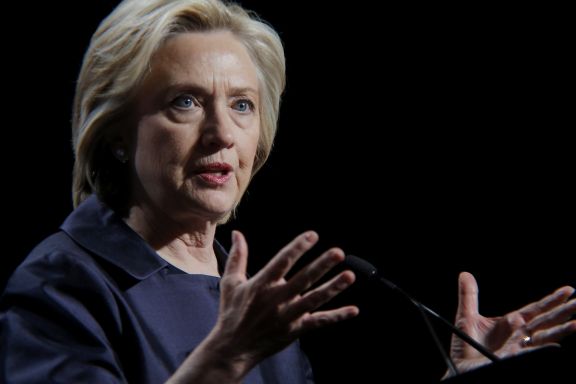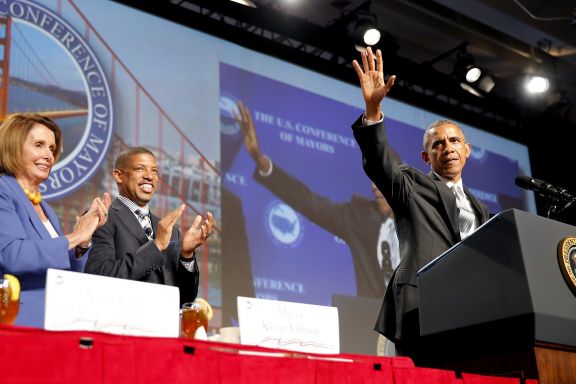| |
The last two days and through Monday, I am representing Richmond attending the U.S. Conference of Mayors in San Francisco. It has been an extraordinary opportunity to learn, advocate, network and , yes, even party.
As a member of the Housing and Community Development Standing Committee, I voted to support the mortgage relief resolution described in the article below, “Bay Area mortgage relief target of mayors.” Tomorrow I will vote on it when it comes before the full Conference.
I was able to speak at length with a high ranking HUD official about Richmond’s challenges dealing with HUD, and tomorrow I will be meeting with the National Park Service Director Jon Jarvis about National park Service programs that can help Richmond.
I had a front row seat at President Obama’s address, but I missed Hillary Clinton to attend the Juneteenth parade yesterday.
I have been able to meet with other Bay Area mayors, including Libby Schaaf and Ed Lee to discuss common interests and programs.
Now, I’m back on BART to San Francisco for more.
Bay Area mortgage relief target of mayors
By Karina Ioffee kioffee@bayareanewsgroup.com
Posted: 06/19/2015 01:24:50 PM PDT0 Comments | Updated: a day ago
Bay Area mayors are asking banks and federal agencies to offer their distressed mortgages first to nonprofit organizations to help keep homeowners in their houses and rents low.
This weekend, the mayors of Oakland, Berkeley, Richmond and San Jose, along with leaders of 14 other cities around the country, will present a resolution at the U.S. Conference of Mayors in San Francisco asking holders of delinquent mortgages, such as the U.S. Department of Housing and Urban Development, Fannie Mae, Freddie Mac and banks, to give priority to housing groups that work to reduce payment for residents facing foreclosure.
If foreclosure is unavoidable, the resolution calls for properties to be sold to organizations that have a plan to keep properties from being scooped up by investor groups.
Since 2012, private equity groups, hedge funds and other Wall Street speculators have spent at least $25 billion to buy more than 150,000 houses, according to Keefe, Bruyette & Woods Inc.
That has displaced long-term residents, many in minority communities, boosted rents and changed neighborhood demographics, as seen in parts of Oakland, San Jose and Richmond.
"There's a better path here than selling these mortgages to speculators and hedge funds," said Gayle McLaughlin, a Richmond city councilwoman and former mayor. "We understand that owners of mortgages need to recoup funds, but our communities and neighborhoods are the ones that really need to recover in terms of their livelihoods."
Advertisement
The mortgages are often bundled into pools worth up to a billion dollars, effectively shutting out nonprofits who have capital but can't compete with Wall Street's deep pockets.
According to PropertyRadar, a company that tracks real estate data, cash sales represented more than 20 percent of all home sales in California in March 2015, and institutional purchases of trustee sales represented 10 percent of all trustee sales.
Earlier this month, The Blackstone Group, a global private equity firm, became the nation's largest landlord of single-family rentals.
By keeping mortgages locally owned or at least in the hands of housing organizations, families are less likely to be displaced, say supporters. They also say the move is needed because while HUD, Fannie Mae and Freddie Mac have millions of distressed mortgages on the books, they don't assist families who are struggling with payments.
"These sales should be an opportunity to improve outcomes for the agency and for homeowners," said Lisa Donner, executive director of Americans for Financial Reform, a coalition of business, civil rights, labor and community groups that is backing the national resolution.
"It's too easy for speculative buyers to displace responsible ones and do further harm to homeowners and communities."
HUD spokesman Cameron French said that the agency made some changes to its Distressed Assets Stabilization Program in April, including requiring loan servicers to delay foreclosure for a year and creating "nonprofit only" sales pools where organizations won't have to compete with Wall Street for mortgages.
"We've had a very long and continuous engagement with the nonprofit community and are always looking for the best programs possible," French said.
The seeds of the national resolution were planted in January when the Richmond City Council approved its Foreclosure Prevention and Neighborhood Stabilization Program.
That helped spur a coalition of other cities to bring the idea to the annual gathering of mayors. On Thursday, supporters also sent letters to HUD, Fannie Mae and Freddie Mac asking to discuss the plan.
Since the beginning of the housing crisis in 2007, more than 4 million families have lost their homes to foreclosure.
Contact Karina Ioffee at 510-262-2726 or kioffee@bayareanewsgroup.com. Follow her at Twitter.com/kioffee
Star U.S. mayors poised to rocket up the political ladder
By Carla Marinucci and Lizzie Johnson
June 20, 2015 Updated: June 21, 2015 12:18am
When Hillary Clinton spoke before 280 mayors in San Francisco Saturday, she gave a respectful nod to the elected leaders who still largely enjoy what most Washington politicians sorely lack — credibility with voters.
“There’s no Democratic or Republican way to pick up the garbage,” the Democratic presidential candidate said to laughs at the U.S. Conference of Mayors, gathered for a three-day conference at the San Francisco Hilton Hotel. “You pick it up or you don’t.”
Clinton wasn’t alone in acknowledging the growing clout of urban leaders, who have shown political muscle on planning, economic and quality of life issues that often extend far beyond their city limits.
“Mayors get the job done,” President Obama agreed in his speech to the mayors Friday. But for them to succeed, he said, “it’s not sufficient to blather on — you actually have to do something.”
With polls showing that three-quarters of American voters have little confidence in Congress and two-thirds worry about the country’s direction, experts say it may be the roll-up-your-sleeves mayors, tackling issues like climate change, education and police brutality, who are in the best position to shake up the national agenda — and move up the political ladder.
U.S. Conference of Mayors

Emotional Clinton urges mayors to face ‘deep fault line’ of
President Obama departs San Francisco for Palm Springs
Obama calls for ‘urgency’ on guns in S.F. speech to mayors

S.F., city where sunshine and Republicans are equally rare
“Mayors are what we call open-source leaders: We don’t care if the ideas are from the Democrats or the Republicans, left or right, business or labor,” said Sacramento Mayor Kevin Johnson, outgoing head of the U.S. Conference of Mayors.
“We just want to get things done. ... We can’t point the finger, we can’t blame it on someone else,” said Johnson, who was repeatedly mentioned as a future political star. No wonder there’s a saying, he noted, that voters can usually name just two politicians — “the mayor and the president.”
Closer to constituents
Eric McGhee, a research fellow at the Public Policy Institute of California, said that’s because unlike Congress, where debate is often mired in partisan quicksand, “we have a lot more and greater experimentation at the local level” on issues directly related to the lives of average Americans.
So today, mayors are more than ever poised to be the rising stars of American politics, “because they have the flexibility to pursue initiatives ... and often open up bigger topics of debate,” he said.
“The city, always the human habitat of first resort, has in today’s globalizing world once again become democracy’s best hope,” with mayors the key to that change, writes political theorist Benjamin R. Barber in his book, “If Mayors Ruled the World: Dysfunctional Nations, Rising Cities.”
“Urbanity may not be our nature, but ... by chance or design, it defines how we live, work, play and associate,” he writes. And with more than half of the world’s population now living in cities — which comprise nearly 80 percent of the developing world — he argues, that’s where politics matters most.
San Francisco Mayor Ed Lee, who had a star role as host of the conference, said that the powerful mandate of the job is improving lives — and that is “what binds us as mayors.”
“Whether it’s infrastructure, race relations, police relations, it’s got to end up that we have residents feeling like they’re part of a city that’s diverse and inclusive,” he said Saturday. “We have no excuse. We can’t hide in indecision.”
Louisville Mayor Greg Fischer agrees that direct accountability is the difference for many in the mayors’ seat. “We can’t sit around and pontificate. We live with our constituents. ... You get feedback constantly throughout the day,” he said. “We aren’t removed from our constituents like people are in the state capitals and federal capitals.”
Gov. Jerry Brown, former mayor of Oakland, is only the most recent California mayor to prove that that spotlight and intimate connection can be a blessing when it comes to moving up the political ladder.
On the national front, former Newark Mayor Corey Booker, who marshaled social media and urban issues to forge a national profile and then made his way to the U.S. Senate, represents the cadre of mayors turned political stars because of their sometimes politically risky work on city issues.
In California, prominent mayors — and former mayors like San Francisco’s Gavin Newsom and Los Angeles’ Antonio Villaraigosa — dominate the list of rising political stars.
Up-and-comers
On the Democratic side, those include Johnson and Los Angeles Mayor Eric Garcetti.
Garcetti, rumored to be interested in a future statewide run — perhaps for Senate or governor — was the star of a San Francisco fundraiser during the mayor’s conference hosted by Lenny Mendonca, director emeritus of management consultants McKinsey & Co., and Wade and Lorna Randlett, two major Democratic campaign contributors.
On the Republican side, Fresno’s Ashley Swearengin, who ran a strong campaign for state controller in 2014, and San Diego Mayor Kevin Faulconer are repeatedly cited as the state GOP’s best hopes for statewide office.
Oakland Mayor Libby Schaaf, another to watch in future state politics, says she was born and raised in her city, and that gives her a deep appreciation for “its uniqueness, its potential, its history and its future and how those ... things are inextricably linked.”
Since being elected late last year, Schaaf has already directly confronted her city’s considerable challenges of urban development, crime, income inequality and gentrification, education and jobs. She hears from her constituents constantly as she “bumps into them in the grocery stores.”
But it is the dynamism of leadership in America’s urban centers, she said, that is where the country’s future — and solutions to key problems — really lies.
“There is a visceral connectedness mayors have in their towns,” she said. “We can’t afford to be bound in philosophy or partisanship because we have real problems to solve every day — and they’re right on our doorsteps.”
Carla Marinucci and Lizzie Johnson are San Francisco Chronicle staff writers. E-mail: cmarinucci@sfchronicle.com, ljohnson@sfchronicle.com Twitter: @cmarinucci, @lizziejohnsonnn
|
|

